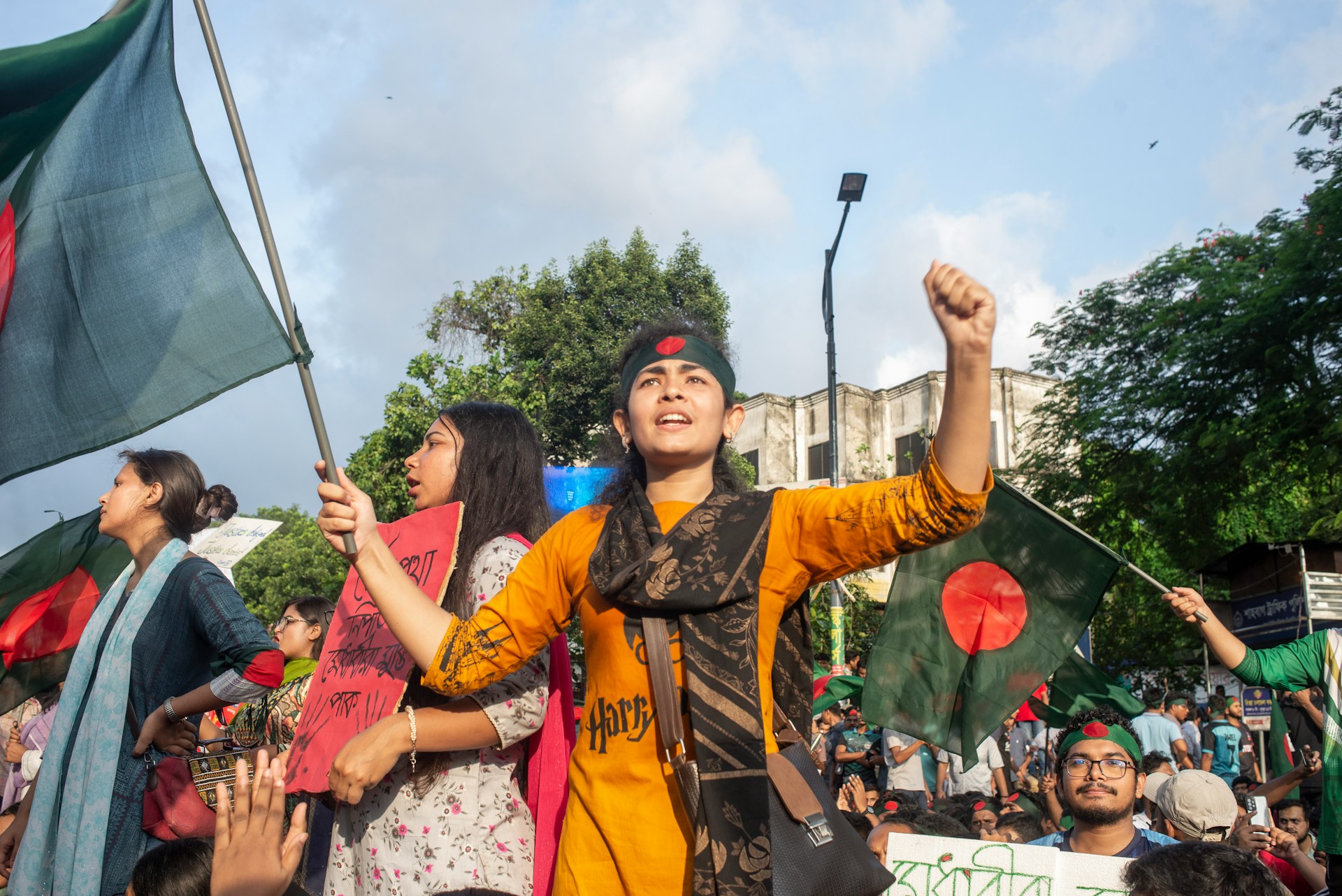McLeod Group guest blog by Lilly Nicholls and Syed Sajjadur Rahman, August 14, 2025
In the summer of 2024, what started as protests against expanded government quotas for descendants of the 1971 Independence War spiralled into a nationwide uprising against the perceived authoritarianism and impunity of the 15-year rule of Sheikh Hasina and the Awami League. Attempts to quell the uprising through a violent crackdown failed, leaving 1,400 dead and 11,700 in jail. Hasina was forced into exile in India on August 5. An interim government was formed, led by Grameen Bank founder and Nobel laureate, Dr. Mohammed Yunus, consisting of civil society leaders, retired bureaucrats and student movement leaders. The future of Bangladesh now hangs in the balance and depends on decisions taken by this government, pressure from public opinion, and roles played by foreign actors.
Balancing on a Razor’s Edge
Over the last decade, Bangladesh has reduced extreme poverty and become a lower-middle-income economy. However, income distribution remains highly uneven, determined by a kleptocratic governance structure resembling a colonial semi-feudal system rather than an independent democracy. The interim government is attempting to end corrupt banking practices and illicit financial outflows (US$16 billion annually, more than double the amount received in foreign aid). Continuation of key infrastructure projects and a comprehensive report on the State of the Economy were well received by Bangladeshis and the international community.
But is this enough? Economically, how can Bangladesh offset the new US tariffs, especially as they apply to the low-wage, ready-made garment exports that the country heavily depends on? How does it continue to evolve by investing in competitiveness, technical skills and innovation? Most importantly, how does Bangladesh use its greatest asset – its 40 million youth – as an engine of growth? The situation is particularly concerning for young women – 25% are teenage mothers and 75% of married women experience gender-based violence at home.
The political sphere poses grave risks. This past year, Bangladesh has experienced heightened insecurity due to continued protests on various grievances, aggravated by police reluctance to maintain order and by mob justice against Awami League sympathizers and attacks on religious minorities. Equally worrisome, tensions between moderate secularists and Islamic fundamentalists are becoming more threatening.
Those long-term challenges require action beyond the lifespan of the interim government. In addition to his tenuous constitutional legitimacy, Yunus faces the untenable position of having to balance demands for immediate elections against demands for elections at a later date. The army seems to prefer a quick election, as do political parties like the Bangladesh Nationalist Party (BNP), the only other political party to have ever held power, but which did not participate in the 2024 election. The students, on the other hand, would like more time to consolidate their nascent National Citizen Party, as does the pro-Islamic Jamaat-e-Islami,which had been banned until recently and aims to grow its base. Banning the Awami League, even temporarily, may hinder free-and-fair elections. It is an almost no-win situation: The government needs to hold an election before violent protests on the streets escalate, but the next elected government may be just as pernicious and corrupt as previous ones. Most fundamentally, it is implausible that the interim government can realistically start building publicly accountable institutions with checks and balances, especially a bureaucracy, that serves the interests of Bangladeshi citizens.
The International Equation: Why Should Canadians Care?
Bangladesh is a critical battleground for broader geopolitical interests, with India and the US struggling to maintain their historic influence and superpowers like China and Russia vying to expand their hegemony and improve access to the Bay of Bengal. With 170 million people and a mostly Muslim population, Bangladesh is also an ideological flashpoint between secular democracy and Islamic radicalization.
As one of the first countries to recognize and aid Bangladesh after its independence, Canada is seen by Bangladeshis as a respectful partner with growing ties, including $5 billion in two-way trade, 100,000 Bangladeshi-Canadians and 10,000 Bangladeshis who study in Canada. Very significant to Bangladeshis, Canada highlighted human rights violations and democratic shortfalls under the Awami League government when it mattered most. The Canadian government, commercial enterprises and civil society groups have also promoted labour rights through support for Corporate Social Responsibility standards for the garment workers following the Rana Plaza incident.
Canada is well placed to generate mutually beneficial opportunities by supporting Bangladesh’s democratic and economic transformation. Concrete actions could include technical assistance in areas of institutional strengthening and policy reforms where Canada has expertise, such as reconciliation processes, electoral capacity, judicial reform, illicit funds repatriation, revenue collection, agricultural modernization and technical vocational education. Canada’s Indo-Pacific Strategy needs to view Bangladesh as a conduit for expanding commercial opportunities. Accelerating bilateral free trade talks, a foreign investment protection agreement and providing incentives to Canadian businesses seeking to diversify export destinations and supply chains would advance both Bangladesh’s growth and Canada’s interest in expanding its markets.
Dr. Lilly Nicholls was Canada’s High Commissioner to Bangladesh and is currently a Professional in Residence at the University of Ottawa’s School of International Development and Global Studies. Dr. Syed Sajjadur Rahman was a senior-ranking executive at the Canadian International Development Agency and is now a Senior Fellow at the Norman Paterson School of International Affairs at Carleton University. Image: Tanvir Khondokar.
